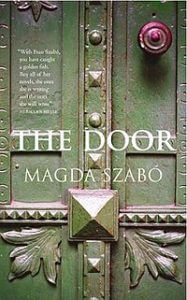By Abeer Hoque
 “One can tell instinctively what sort of flower a person would be if born a plant.”
“One can tell instinctively what sort of flower a person would be if born a plant.”
The Door is the plainspoken eloquent and devastating novel by Hungarian great, Magda Szabó (translated by Len Rix).
It tells the story of Emerence, a character of epic, almost mythological strength, eccentricity, and purity. She’s an elderly housekeeper for several families in Budapest or a town on its environs. Her complex and tragic history is revealed over the course of the novel by one of her employers who befriends Emerence as much as anyone can with Emerence’s intense and brutal honesty. Or in the narrator’s words: “She was fearless, enchantingly and wickedly clever, brazenly impudent.”
One of the most interesting and frustrating parts of the novel is how awful the narrator is. This woman, a writer on the verge of literary stardom, appears so utterly selfish and self-absorbed, so unthinking and unkind, and in such ordinary believable ways, it made me want to scream. The unfolding of the events was like watching a train wreck, and you already know the end, because that’s how the book starts: “I killed Emerence. The fact that I was trying to save her rather than destroy her changes nothing.”
Because the narrator is a writer, she is also capable of great discernment, subtle and piercing awareness, gorgeous language. At times her lines and passages allude to ancient Greek and Roman texts and characters: “The two lions on the gate of Mycenae stirred; each grew a living eye, one green, one blue, and they began quietly to miaow.” The characters—the novel’s great gift—seem drawn straight from fairytales, weird and wonderful and larger than life.
But when it comes to how the writer should and could treat Emerence, a woman who has become a part of her family, she fails, again and again, and it’s horrible to watch. My sister had to stop reading the book she hated the narrator so much. I did the opposite – I was so enrapt by Emerence, I couldn’t stop reading. I was also fascinated by how Szabó is able to create a character no doubt like herself but with such disagreeable yet real qualities. It’s a considerable and rare achievement. I did wish I were more versed in Hungary’s political and cultural history because I think it would have lent more nuance and context to some of the narrator’s more perplexing actions. I believe her trajectory in the novel is symbolic of Hungary’s state of the arts and how challenging it must have been to be an artist in those times.
The parts about writing as a profession are deeply thoughtful. For example, what the narrator says about creativity requiring a state of grace: “So many things are required for it to succeed—stimulus and composure, inner peace and a kind of bitter-sweet excitement.” Or when things don’t go well: “stunted embryos of meaningless sentences emerging under my exasperated fingers.”
Because the hero and victim of this tragedy is Emerence, and the one who is ‘stupid, and full of envy” survives and gets to tell the story, I can only hope that the narrator’s last thought is true: “The dead always win. Only the living lose.”
The Door
Magda Szabó
NYRB Classics
ISBN: 978-1590177716









